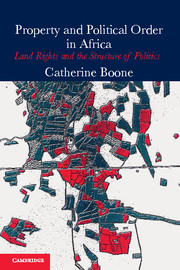Book contents
- Frontmatter
- Dedication
- Contents
- List of Figures, Tables and Maps
- Preface and Acknowledgments
- 1 Introduction
- Part I Property Rights and the Structure of Politics
- Part II
- Part III
- Political Scale
- 6 Land Conflict at the Micro-Scale: Family
- 7 The Local State as an Arena of Redistributive Conflict
- 8 Land Conflict at the National Scale
- Part IV
- Appendix Land Politics Cases and Sources
- References
- Index
Political Scale
Property Institutions and the Scale and Scope of Conflict
Published online by Cambridge University Press: 05 June 2014
- Frontmatter
- Dedication
- Contents
- List of Figures, Tables and Maps
- Preface and Acknowledgments
- 1 Introduction
- Part I Property Rights and the Structure of Politics
- Part II
- Part III
- Political Scale
- 6 Land Conflict at the Micro-Scale: Family
- 7 The Local State as an Arena of Redistributive Conflict
- 8 Land Conflict at the National Scale
- Part IV
- Appendix Land Politics Cases and Sources
- References
- Index
Summary
The quarrels and disputes have the effect of turning family members into “strangers,” or those who do not belong on family land. Often accusations of witchcraft accompany the final rupture when a family sub-group is driven out of the area, thereby ceding the family land to those who remain.
(Peters 2002, 158)The problem around here is that when the town reaches your land, the chiefs take it and there is nothing you can do. You are just on your own. People are angry, but there is nothing they can do because they are committed to respect for chiefs. Yes, people should band together to resist, but they do not.
(Assemblyman in periurban Kumasi, 21 July 2009)The government and Hutu extremists purposefully politicized the land issue.…Claims to land by returning Tutsi were used to cast Tutsi intentions as an attempt to capture the state and reclaim scarce land from Hutu.…This resonated with poor rural Hutu who were concerned about the security of their own land rights.
(Bigagaza et al. 2002, 73)Mahmood Mamdani describes African states as “bifurcated states” that institutionalized two different modes of state-society relations: a civic, republican mode for the urban areas, and an authoritarian, nonliberal mode for the rural areas. As Mamdani's analysis suggests, a subnational rural jurisdiction in which chiefly authority holds sway is not a miniature version of a national arena organized around a republican form of government. Although local units are nested into a national hierarchy, the modes of political representation, association, participation, and contestation that prevail at different levels of the system are not necessarily the same. Where a chiefly jurisdiction is nested into a national administrative hierarchy, the character and procedures of the national state are at least formally bureaucratic, secular, and constitutional, whereas at the local level, the character of public authority and government is at least partially hereditary, neocustomary, and nonsecular. African political systems are thus marked by what Schattschneider (1960) and Gibson (2005, 2012) have described as heterogeneity of scale.
- Type
- Chapter
- Information
- Property and Political Order in AfricaLand Rights and the Structure of Politics, pp. 177 - 187Publisher: Cambridge University PressPrint publication year: 2014



